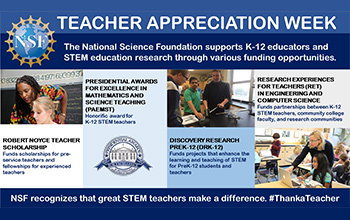
Research News
During Teacher Appreciation Week, the National Science Foundation highlights grants and scholarships that promote best teaching practices
May 12, 2017
The Puritans founded Boston Latin School in 1635, the first public school in the original 13 colonies and the oldest existing school in the United States. For 382 years, public school teachers in America — and even longer for private school teachers — have encouraged students to invent their own futures.
Originally established to teach Latin, classical literature and religion, today’s Boston Latin School offers its 7th-12th grade students courses on current scientific research, popular science and science initiatives. In its efforts to inspire and prepare the next generation of scientific pioneers, the school is a bellwether for exceptional teachers and academics across the United States.
Each year, during the first full week in May, Teacher Appreciation Week honors outstanding educators like those at Boston Latin. The National Science Foundation (NSF) honors teachers during this week and throughout the year with grants, scholarships and initiatives designed to increase student learning, support innovative teaching approaches and promote best teaching practices.
Here are a few of the ways in which NSF honors K-12 teachers and supports science, technology, engineering and mathematics (STEM) learning:
Discovery Research K-12 (DRK-12)
NSF’s DRK-12 program seeks to significantly improve how PreK-12 students learn and teachers teach STEM. The program uses innovative research and development resources, models and tools to address immediate challenges facing PreK-12 STEM education. It recognizes the interaction among assessment, learning and teaching while supporting five types of projects: (1) Exploratory, (2) Design and Development, (3) Impact, (4) Implementation and Improvement and (5) Conferences and Syntheses.
Excellence Awards in Science and Engineering (EASE)
The EASE program encompasses the Presidential Awards for Excellence in Mathematics and Science Teaching (PAEMST). PAEMST is the U.S.’s highest recognition for outstanding teaching in K-12 mathematics and science. NSF manages the awards on behalf of the White House.
Innovative Technology Experiences for Students and Teachers (ITEST)
ITEST is a program that promotes PreK-12 student interest in STEM with an emphasis on information and communications technology (ICT). The program seeks to excite students about the future STEM and ICT workforce. ITEST supports development, implementation and selective spread of innovative strategies that increase student awareness of STEM and ICT careers, motivates students to pursue the education necessary to participate in those careers and provides students with technology-rich experiences that develop their knowledge of related content and skills. ITEST projects must involve students and may also include teachers.
Research Experiences for Teachers (RET) in Engineering and Computer Science
This program brings knowledge of engineering, computer and information science and technological innovation to pre-college/community college classrooms. It enables K-12 STEM teachers and community college faculty to translate their research experiences and new knowledge gained in university settings into classroom activities.
Robert Noyce Teacher Scholarship Program
NSF’s Robert Noyce Teacher Scholarship Program uses scholarships, stipends and fellowships to encourage talented STEM majors and professionals to become K-12 STEM teachers. The program’s Master Teaching Fellowships Track (MTF) also offers awards to institutions to administer fellowships and programmatic support to experienced and exemplary K-12 STEM teachers.
STEM + Computing Partnerships (STEM+C)
As computing becomes an integral part of modern STEM practice, STEM+C addresses the urgent need to prepare students from the early grades through high school in the essential computational skills, competencies and dispositions. STEM+C advances the integration of computational thinking and computing activities from Pre-K-12.
—
Bobbie Mixon,
(703) 292-8485 bmixon@nsf.gov







